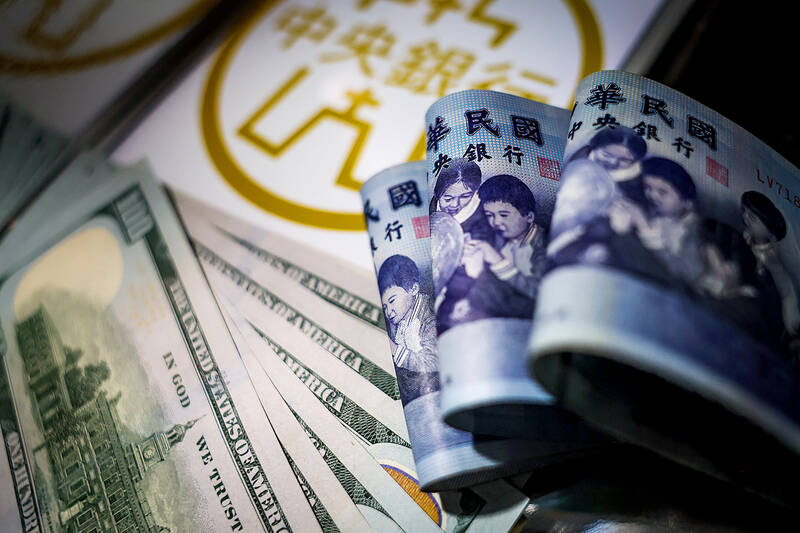The New Taiwan dollar saw a sharp move lower in late trading yesterday, after earlier climbing past a key level for the first time since 2022, stoking speculation the central bank might have intervened to curb the rally.
State banks were seen aggressively buying the US dollar to slow the local currency’s appreciation, said two traders who asked not to be identified as they were not authorized to speak publicly.
The central bank has been seeking to tamp down speculation in foreign exchange markets this year after the local currency’s rally.

Photo: CNA
The NT dollar trimmed about 0.7 percent of gains versus the greenback in a rapid move and closed little changed. Earlier yesterday, it rallied past 29 for the first time in more than three years.
Some market watchers see the central bank behind the sudden reversal of the NT dollar.
The operation “can help to slow the pace of the NT dollar appreciation, but it cannot reverse the trend,” Oversea-Chinese Banking Corp senior foreign-exchange strategist Christopher Wong (黃經隆) said.
“Another wave of broad US dollar selling may see the pair test lower again, but for now the implicit message is that authorities are watching and are likely to guard against excessive volatility,” he said.
With its 12 percent advance, the NT dollar is Asia’s best performer this year. The surge comes as foreign investors snapped up local shares and exporters ramped up their selling of the greenback amid concerns the US currency would keep falling. Repatriation of funds from the nation’s asset managers also played a role.
The almost unprecedented rally is posing a risk to the nation’s export-reliant economy and putting pressure on the life insurance industry, which has massive exposure to US dollar-denominated assets.
It is also taking a toll on Taiwan Semiconductor Manufacturing Co (台積電), which is set to inject US$10 billion in capital to shore up currency hedging operations.
Due to the sharp currency appreciation, Taiwan’s life insurers are facing significant losses in the first half as the move drives down the nominal value of their about US$786 billion foreign-currency assets.
Regulators have taken steps to give life insurers more flexibility in using their reserves to cushion the impact, and the central bank on Wednesday said it had asked foreign speculators to exit bets on the local currency taken through exchange-traded funds.
If currency gains continue, the central bank “might have no choice but to step up more explicit actions to slow it versus just doing window guidance,” Bloomberg Intelligence's chief Asia foreign exchange and rates strategist Stephen Chiu (趙志軒) said.

IN THE AIR: While most companies said they were committed to North American operations, some added that production and costs would depend on the outcome of a US trade probe Leading local contract electronics makers Wistron Corp (緯創), Quanta Computer Inc (廣達), Inventec Corp (英業達) and Compal Electronics Inc (仁寶) are to maintain their North American expansion plans, despite Washington’s 20 percent tariff on Taiwanese goods. Wistron said it has long maintained a presence in the US, while distributing production across Taiwan, North America, Southeast Asia and Europe. The company is in talks with customers to align capacity with their site preferences, a company official told the Taipei Times by telephone on Friday. The company is still in talks with clients over who would bear the tariff costs, with the outcome pending further

A proposed 100 percent tariff on chip imports announced by US President Donald Trump could shift more of Taiwan’s semiconductor production overseas, a Taiwan Institute of Economic Research (TIER) researcher said yesterday. Trump’s tariff policy will accelerate the global semiconductor industry’s pace to establish roots in the US, leading to higher supply chain costs and ultimately raising prices of consumer electronics and creating uncertainty for future market demand, Arisa Liu (劉佩真) at the institute’s Taiwan Industry Economics Database said in a telephone interview. Trump’s move signals his intention to "restore the glory of the US semiconductor industry," Liu noted, saying that

STILL UNCLEAR: Several aspects of the policy still need to be clarified, such as whether the exemptions would expand to related products, PwC Taiwan warned The TAIEX surged yesterday, led by gains in Taiwan Semiconductor Manufacturing Co (TSMC, 台積電), after US President Donald Trump announced a sweeping 100 percent tariff on imported semiconductors — while exempting companies operating or building plants in the US, which includes TSMC. The benchmark index jumped 556.41 points, or 2.37 percent, to close at 24,003.77, breaching the 24,000-point level and hitting its highest close this year, Taiwan Stock Exchange (TWSE) data showed. TSMC rose NT$55, or 4.89 percent, to close at a record NT$1,180, as the company is already investing heavily in a multibillion-dollar plant in Arizona that led investors to assume

AI: Softbank’s stake increases in Nvidia and TSMC reflect Masayoshi Son’s effort to gain a foothold in key nodes of the AI value chain, from chip design to data infrastructure Softbank Group Corp is building up stakes in Nvidia Corp and Taiwan Semiconductor Manufacturing Co (TSMC, 台積電), the latest reflection of founder Masayoshi Son’s focus on the tools and hardware underpinning artificial intelligence (AI). The Japanese technology investor raised its stake in Nvidia to about US$3 billion by the end of March, up from US$1 billion in the prior quarter, regulatory filings showed. It bought about US$330 million worth of TSMC shares and US$170 million in Oracle Corp, they showed. Softbank’s signature Vision Fund has also monetized almost US$2 billion of public and private assets in the first half of this year,